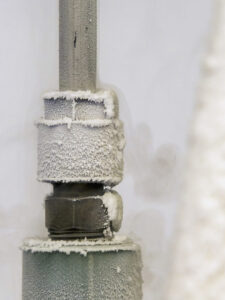
Preventing frozen pipes in winter is essential to avoid a plumbing disaster that could lead to major property damage.
Winter can be a beautiful season, but the colder temperatures bring a serious risk for homeowners: frozen pipes. When water freezes, it expands, which can lead to burst pipes, water damage, and expensive repairs. Fortunately, with some proactive steps, you can prevent your plumbing from freezing and keep your home safe during the chilly months. While most people know about allowing water to drip during sub-freezing temperatures, there are several other steps you can take to further minimize the risk.
Insulate Your Pipes
One of the most effective ways to prevent frozen pipes is to insulate them, especially those located in unheated areas such as basements, attics, garages, or crawl spaces. Pipe insulation sleeves, heat tape, or thermostatically controlled heat cables can help maintain a temperature that keeps the water from freezing.
Seal Cracks and Gaps
Inspect your home for cracks or gaps near pipes, especially where they enter the house. Cold air entering through these openings can significantly lower the temperature around the pipes, increasing the risk of freezing. Use caulk or insulation to seal these areas.
Keep the Heat On
If you plan to leave your home for an extended period, keep the thermostat set to at least 55°F (13°C). This ensures that your home’s interior stays warm enough to prevent freezing, even when you’re not there.
Maintain Heating Systems
Ensure your home’s heating system is in good working condition before the temperatures drop. Regular maintenance checks can help avoid unexpected breakdowns that could leave your home and pipes without heat.
Let Faucets Drip
During particularly cold nights, allowing a slow drip from faucets can help prevent pipes from freezing. The flowing water reduces pressure build-up and makes it less likely for pipes to freeze and burst.
Open Cabinet Doors
Pipes under sinks in kitchens and bathrooms are often against exterior walls, making them susceptible to freezing. Opening cabinet doors allows warm air to circulate around the plumbing, reducing the risk.
Disconnect and Drain Outdoor Hoses
Disconnect garden hoses from outdoor faucets, and drain them before storing for the winter. Leaving hoses connected can trap water in the faucet, which can freeze and cause the pipe leading into your home to burst.
Know Where Your Main Water Shut-Off Is
In the event that a pipe does freeze and burst, knowing where your main water shut-off valve is located can minimize water damage. Make sure everyone in your household knows how to turn off the water supply quickly.
Keep Garage Doors Closed
If you have water supply lines in the garage, keep the garage doors closed to retain as much warmth as possible inside.
Call Mahon Plumbing Today
If you still have more questions regarding your plumbing, we here at Mahon Plumbing are here to help. We have been serving the wider Baltimore area since 1994, so we have 25 years of experience to back up our fantastic service! Call us at our Baltimore location at 410-766-8566 or our Pasadena location at 410-636-7944. Be sure to keep up with us on social media by following us on Facebook or Twitter.
